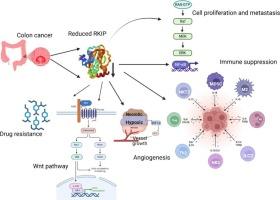Raf-kinase inhibitor protein (RKIP): A therapeutic target in colon cancer
IF 9.7
1区 医学
Q1 BIOCHEMISTRY & MOLECULAR BIOLOGY
Biochimica et biophysica acta. Reviews on cancer
Pub Date : 2025-07-16
DOI:10.1016/j.bbcan.2025.189387
引用次数: 0
Abstract
Raf-kinase inhibitor protein (RKIP) plays a significant role in maintaining cell homeostasis, and its downregulation is a hallmark of various cancers, including colorectal cancer (CRC). It modulates several signals, including MAPK (Raf/MEK/ERK), NF-κB, STAT3, cell cycle, and GPCR signaling by modulating phosphorylation state. It's binding to Raf-1 inhibits phosphorylation and makes the signaling molecules inactive. In the case of NF-κB, which plays a central role in drug resistance, RKIP interacts with IκBα and inhibits IKKα, IKKβ, and NIK by preventing their phosphorylation, thereby maintaining NF-κB in an inactive state. A reduction in the expression level of RKIP increases the metastasis and promotes the signaling associated with cancer progression. This review examines the role of RKIP in the aggressiveness and metastasis of CRC. Several signal pathways influenced by changes in the expression level of RKIP are discussed in detail. Strategies like the use of inhibitors, understanding the role of miRNA, immunotherapy, and combined therapies have been discussed in detail, along with the clinical implications of RKIP in CRC.

raf激酶抑制蛋白(RKIP):结肠癌的治疗靶点
raf -激酶抑制剂蛋白(RKIP)在维持细胞稳态中起着重要作用,其下调是包括结直肠癌(CRC)在内的多种癌症的标志。它通过调节磷酸化状态调节多种信号,包括MAPK (Raf/MEK/ERK)、NF-κB、STAT3、细胞周期和GPCR信号。它与Raf-1结合抑制磷酸化并使信号分子失活。在耐药过程中发挥核心作用的NF-κB中,RKIP与i -κB α相互作用,通过阻止IKKα、IKKβ和NIK的磷酸化抑制它们,从而维持NF-κB处于失活状态。RKIP表达水平的降低增加了转移并促进了与癌症进展相关的信号传导。本文综述了RKIP在结直肠癌侵袭性和转移中的作用。详细讨论了受RKIP表达水平变化影响的几种信号通路。本文详细讨论了抑制剂的使用、理解miRNA的作用、免疫治疗和联合治疗等策略,以及RKIP在结直肠癌中的临床意义。
本文章由计算机程序翻译,如有差异,请以英文原文为准。
求助全文
约1分钟内获得全文
求助全文
来源期刊

Biochimica et biophysica acta. Reviews on cancer
医学-生化与分子生物学
CiteScore
17.20
自引率
0.00%
发文量
138
审稿时长
33 days
期刊介绍:
Biochimica et Biophysica Acta (BBA) - Reviews on Cancer encompasses the entirety of cancer biology and biochemistry, emphasizing oncogenes and tumor suppressor genes, growth-related cell cycle control signaling, carcinogenesis mechanisms, cell transformation, immunologic control mechanisms, genetics of human (mammalian) cancer, control of cell proliferation, genetic and molecular control of organismic development, rational anti-tumor drug design. It publishes mini-reviews and full reviews.
 求助内容:
求助内容: 应助结果提醒方式:
应助结果提醒方式:


